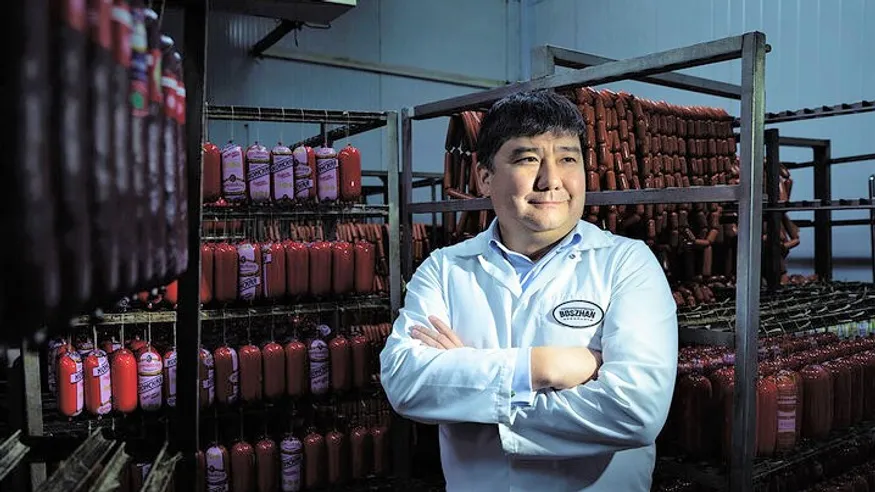The food industry, unlike many other sectors of the economy, has emerged from the anti-pandemic lockdowns and restrictions relatively unscathed. Pervomayskiye Delikatsy (May Day Delicatessen) is a food processing company that produces sausage, processed meat, and deli products. Last year, the company, which has two meat-processing plants - a sausage plant in Koyankus village near Almaty and a complex for butchery and producing meat of various kinds in Korday in the Zhambyl region - produced 1,670 tons of finished products, earning more than 3 billion tenge in revenue. Today, it produces more than 150 kinds of products under trademarks " Pervomayskiye Delikatsy", Boszhan and "Narodnye Sausages". In addition to catering to the domestic market, the company’s products are sold in the UAE, Kyrgyzstan, Oman, Russia, Qatar, and Bahrain. Readers can find the full story in Russian at Forbes.kz.
Meat heritage
Pervomayskiye Delikatsy is run by 44-year-old entrepreneur Nurzhan Bazhanov. In the 1990s, during the collapse of the Soviet Union, Nurzhan's father and his brothers began building their business. Over time, their children began to join the meat-processing business.
"I didn't graduate from any institute of economics or technology. I was interested in production from a young age, and I started working for my father at the age of 17. I gained experience in sales, then I started expanding – first by increasing production at the existing plant, then by opening other sites. Now I know all the processes," says the entrepreneur.
The first plant was launched in 2005. Until 2007, the product was sold in plain packaging, without a specific brand. "When we decided to create a brand, we decided on the name "Pervomayskiye Delikatsy", based on our location which was nearby the village of Pervomayskiy," says Bazhanov. According to his words, positive growth started in 2008, when the company began to actively develop and expand not only the assortment of meat, but also its presence in the market. They launched branded stores, entered the retail chains, and opened branches in other cities.
Simple Difficulties
In 2014, the company took a 10-year loan in the amount of 1.3 billion tenge from the "Damu-Ondiris" program. Part of the funds was used to reconstruct the sausage shop, and part was used to build a slaughterhouse.
Problems in the meat processing industry are expectedly many, sighs Bazhanov. This includes a lack of raw materials and the influx of imported products that are not always of acceptable quality. For these reasons and more, the plant for the production of sausage products works at only 70% of its capacity, and the slaughterhouse only 30%. "This is not just our problem, but the problem of all processors. Many processing plants are less than 50% utilized," the entrepreneur laments.
In 2017, a slaughterhouse was built in Korday, stocked with equipment from leading European manufacturers. The location of the slaughterhouse was not chosen by chance. "The Zhambyl region is rich in small cattle since there is little snow and plenty of pasture. In the north, because of climate conditions, it would be more difficult to breed cattle. Now, practically the whole Korday area supplies cattle to our slaughterhouse. Small peasant farms give us cattle, the products of which are exported to Arab countries. The Chinese market has great potential, but with the pandemic, the process of exploring this area has been put on hold," Bazhanov said.
Persian tales
The company began exporting to the UAE in 2018 after receiving mandatory accreditation there. In successful months, 25-30 tons of meat is sent there. "Today, our lambs, which are popular due to their excellent taste quality, are sold there for $7.5-8 per kilogram, while meat from Sudan, Ethiopia, and Pakistan is $5,” he said. In addition, the company has a license to export sausage products to the Emirates. From this year, 44 types of products under Boszhan and " Pervomayskiye Delikatsy" trademarks will appear in some trade networks in Dubai.
At the same time, the issue of export system to the Qatari market is being worked out. The Maldives market is also being tried, and orders are coming in from Bahrain.
"Once we received an unusual order for 30 whole lamb carcasses with specific criteria, which we carefully chose out of 200 heads. We were asked to cut and pack them. We prepared everything, sent it off, and later found out it was for an event of the Bahraini royal family," says Bazhanov with a satisfied smile.
